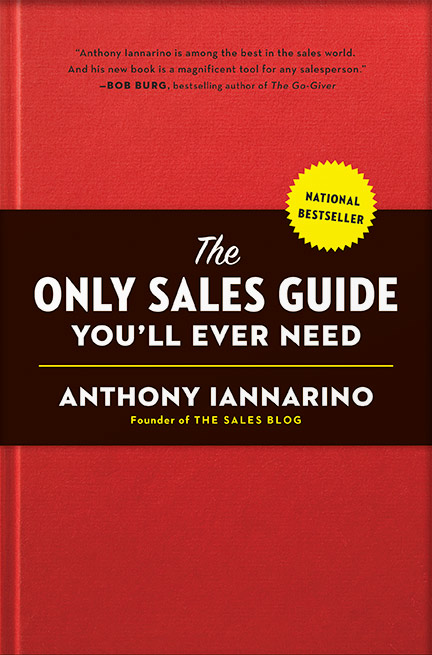So much success in sales (and leadership) is the result of several intangibles, character traits, and attributes outside of skills. One of the reasons we work so hard to teach, train, and develop salespeople around skills is because they are easier than improving the intangibles, and most sales managers and sales leaders lack a competency model that includes what I called, “Mindset,” in The Only Sales Guide You’ll Ever Need.Learn Anthony's core strategies & tactics for sales success at any level with The Only Sales Guide You'll Ever Need
One of the most essential intangibles is attitude. You know when someone has a great attitude. You also know when someone—or a whole team—has a negative mindset.
One of the most challenging things about negative people is that they don’t recognize that they are negative, which can easily spread through the sales force. Because this is true, you have to talk to your sales force about attitude.
The Truth About Sales
There isn’t another role in business where you exert effort trying to help the people produce better results, only to be told “no.” There isn’t another area of our business where we count “wins” and “losses.” What we do in sales isn’t very much like other business functions, and we must recognize that. While these words are accurate, we can’t let them change our attitude.
No one who works in sales in any company anywhere on Earth calls their prospects and always acquires a meeting on their first call. When salespeople are bothered by a client’s refusal to meet, they sometimes describe this as rejection. It’s important to remember that you are not being rejected personally and that client doesn’t even know you.
All it means is they didn’t believe the value proposition met their standard for a meeting. It also might say that we just caught them at the wrong time, in which case, we try again, as outlined in our prospecting sequences.
No one in our profession goes undefeated. No salesperson wins one hundred percent of their deals. Some of the best salespeople win forty to fifty percent of their deals and do incredibly well. We love winning, and we hate losing. But we also accept that we can play our best game and lose without it impacting our attitude.
Much of your success is the result of your attitude. That means we need to ensure we have a good attitude.
Positive, Optimistic, and Empowered
Your client is basing a large part of their decision on you and your performance throughout the sales conversation. Even though you may not recognize that you are projecting negativity, pessimism, or cynicism, your client can pick it up. No one wants to work with someone who has a bad attitude. Most of our clients and prospects have enough negative people in their work lives.
When you show up for a meeting, you should be the best and most positive person in the room. Your attitude and your demeanor should project your confidence and your enthusiasm, transferring your confidence to your prospective clients, and improving your ability to create a preference to buy from you.
Imagine two salespeople are both calling on the same client. One of them has a tremendously positive attitude, and the other is as negative as their peer is positive. Assuming they both have good insights, ideas, and experience, and they both have effective solutions.
The client will have to interact with the salesperson throughout the sales conversation and in all future opportunities. All things being equal outside of attitude and demeanor, the positive salesperson wins.
Even though there are people who don’t believe that it is essential that you are likable, you do want to be the kind of person people want to work with and buy from. Those who say you only need to be smart make two mistakes. First, they mistake the “need to be liked” with being likable, when they are different. Second, they make an error in reasoning to believe that being smart and having a magnetic attitude is mutually exclusive.
Why We Don’t Compromise Our Attitude
In many of sales organizations, people with bad attitudes are allowed to complain, make excuses, blame external events for their results, and walk around in a bad mood, something that not only hurts their results but can also infect other people with the same negative mental state that kills results. If you have a bad attitude or are in a negative state, change your attitude by drinking water, eating something, or doing something physical, which is often the fastest way to improve your state.
When someone is negative or pessimistic, we must help them recognize that they are in an unresourceful state. There is no one here that isn’t going to have good days and bad days, and we are all going to experience adverse events, some that will cause us to have a strong emotional response.
Possessing a positive, optimistic, and empowered attitude doesn’t mean that you aren’t allowed to feel the full range of human emotions, from being disappointed when you lose a tight contest or happy when you land your dream clients.
If you want to improve your attitude, you might start by eliminating mass media and social media. Much of the content is designed to agitate you to capture your attention. You might also surround yourself with positive people who are bullish on life and all its possibilities, distancing yourself from pessimism. Pessimists make more converts to their world view than optimistic people transform into our way of thinking, that’s why we must build the right kind of culture in our company, and especially for our team.

Get the Free eBook!
How to Lead: The Leadership eBook
As leaders, we're faced with decisions everyday—not all of which are easy to make. Learn how to make those tough decisions, hold yourself and your team accountable, and build a legacy with this free eBook.
Download Now







.jpg?width=768&height=994&name=salescall-planner-ebook-v3-1-cover%20(1).jpg)


